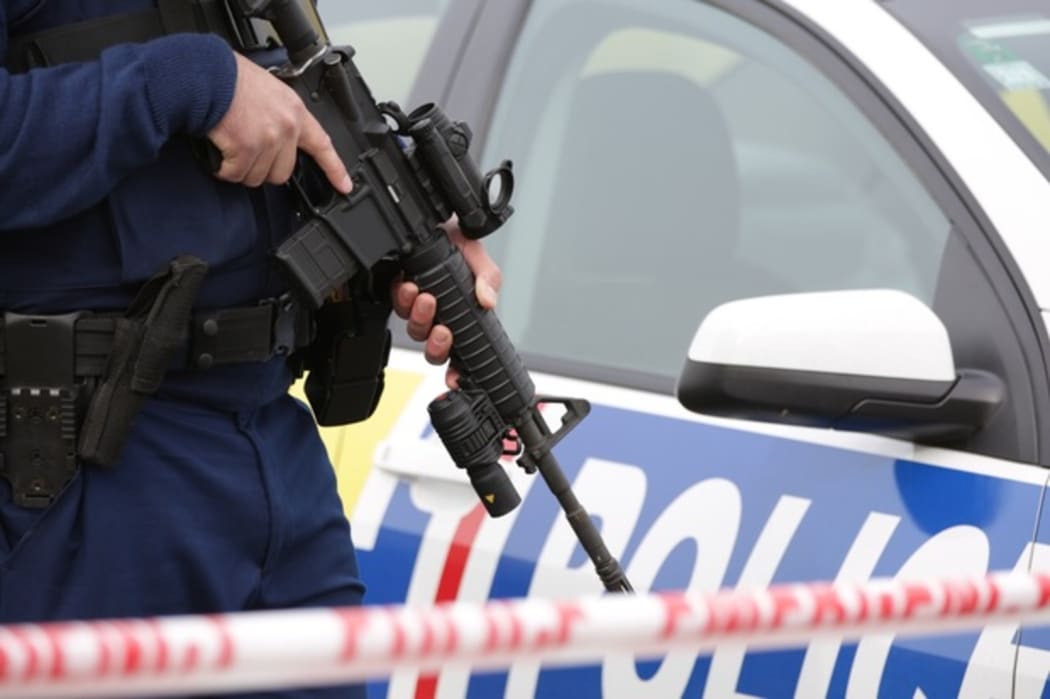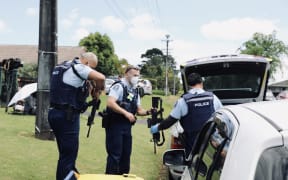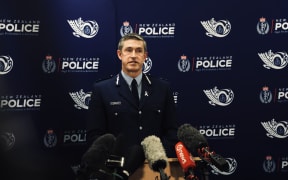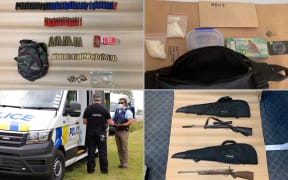A gang expert says police may need to monitor gangs extremely heavily - or get them in a room together - in a bid to quash any tit-for-tat violence that may be brewing.

A police officer holds a firearm. (File photo) Photo: Cole Eastham-Farrelly/RNZ
There is growing concern about what appears to be a rise in gang-linked violence, particularly shootings in Auckland. There have been a number of shootings of homes, shops and people in recent months in Auckland.
Last Wednesday a man was critically injured in Glen Eden in broad daylight; five Comancheros members have since been charged with wounding with intent to cause grievous bodily harm.
Two days later, two people were hospitalised and two arrested after they entered a home also in Glen Eden and attacked those inside, Stuff reported.
And yesterday, three officers were shot and injured, before they shot dead the assailant, again in Glen Eden. This was not believed to be a gang incident - but the Police Association said officers had to deal with five armed gang members just hours later.
Canterbury University criminal justice expert Jarrod Gilbert, wrote a book on the history on New Zealand gangs.
He said returning New Zealanders, deported from Australia under the controversial "501" legislation, have entered gangs and upset the previously established territory stalemate.
"And some of these 501 groups, both in Auckland and in Hawke's Bay, just haven't respected the existing territory that's claimed by other gangs - they've just shown a complete disregard for it. That's seen as a real affront to the established groups, and so conflict, I guess in that sense, is inevitable," Gilbert said.
Groups like the Comancheros, the Mongols and the Rebels have established themselves here, or at least been bolstered, by arrivals from Australia.
Police have long known Australian gangs tend to be more violent.
Police Association President Chris Cahill said that attitude to disputes had been brought here, and established groups have had to up their game in response.
"Well [the environment] did seem to change when some key deportees - gang members - from Australia came back. They seemed to lift the level of violence - they were willing to pull the trigger. It seems New Zealand gang members have now followed along that course," Cahill said.
He said after yesterday's shooting in Glen Eden in which three officers were injured and police shot dead the assailant - which was itself not a gang incident - police had to deal with five armed gang members elsewhere.
Jarrod Gilbert said big conflicts could actually start off with a relatively minor run in.
"But then those incidents lead to tit-for-tat, an escalation of issues. One side is harmed, and then the other side has to get utu for that, and then it climbs from there."
Dr Gilbert said police needed to find a "fire break" to stop increasingly serious retaliatory attacks.
"And that means extremely heavy policing - so targeting those specific groups who are involved and blanket policing them. And also attempting to get the leaders together to sort their differences out in peaceful means. Both work, and both are important."
Cahill was so concerned that he would support a temporary general arming order for the parts of Auckland where it was needed, but noted the District Commander would have better and more current intelligence on whether that was necessary.
Auckland Councillor for the Manukau ward Alf Filipaina said his constituents were telling him they were worried.
"I know they're scared because I'm getting the calls from the people who live in the south. But I also feel for the community in West Auckland."
Prime Minister Jacinda Ardern was confident police have enough resources to tackle crime, including gangs, in Auckland.
"[Police] have gone through a process of what further initiatives will help them in their frontline and tactical responses. They pulled together a package; we've endorsed it and funded it," Ardern said.
Police this month began a trial of what is called the Tactical Response Model, which includes teaching more frontline police - who are generally unarmed - skills similar to those used by the Armed Offenders Squad.




